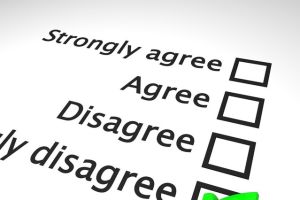Why The Customer Service Research Gets It Wrong:
The Over-Generalization Problem
 Before we look at the evidence that supports or disconfirms the survey research on this subject, we have to address a central problem. If you look at the quotes at the start of this chapter, or at the many articles making similar claims, what should jump out at you is the gross generalization about what “customers” will do. In Chapter xx, we suggested that there is really no such cohesive and homogeneous thing as “customers”. Clearly, there has to be huge differences on whether people will pay more for service depending on the industry or niche, income levels of the customers. Someone struggling to make ends meet isn’t going to be as prone to paying more for anything compared to a very wealthy person. A person flying on business at the company’s expense would likely be far more likely to pay extra for the perks of flying first class than someone paying his or her own freight.
Before we look at the evidence that supports or disconfirms the survey research on this subject, we have to address a central problem. If you look at the quotes at the start of this chapter, or at the many articles making similar claims, what should jump out at you is the gross generalization about what “customers” will do. In Chapter xx, we suggested that there is really no such cohesive and homogeneous thing as “customers”. Clearly, there has to be huge differences on whether people will pay more for service depending on the industry or niche, income levels of the customers. Someone struggling to make ends meet isn’t going to be as prone to paying more for anything compared to a very wealthy person. A person flying on business at the company’s expense would likely be far more likely to pay extra for the perks of flying first class than someone paying his or her own freight.
Even a single customer may sometimes be willing to pay more for service in one context, let’s say purchasing a gift visit to a a luxury spa, compared to going to that spa him or herself.
If you look again at the research snippets at the beginning of the chapter, you’ll see something interesting. The research on mortgages indicates that about a third of people will pay more for mortgages that “come with” better service and less stress. That’s a lot less than the other survey findings that range from sixty five to eighty six percent willing to pay more.If you compare that with the other findings, which are far more general, you see a huge difference in how survey takers responded.
The Psychological Say-Do Paradox
Research companies, and their readers ASSUME that what people say they want, and predict their own behavior, that in fact that’s what they do. There is a marginal tendency for human beings to do what they say they will do, but here’s one of the issues.
People respond to surveys with the implicit assumption that all other factors are equal. That is, givne a choice between two “equal in every way companies”, one that provides great service for a slight extra cost, and a company that provides really bad service without the extra cost, they will almost always say they’ll pay more.
But it’s never the case that all things are equal. Customers make their decisions in real time according to the immediate situation, so, for example, someone in a hurry will go to a place with poor service, generally, because it’s more convenient. Or the same person will sometimes pay more, and sometimes not pay more. People simply don’t act consistently, BUT they say they do.
In addition, you have the situation where customers don’t want to portray to others, or themselves, that they continue to patronize companies with poor service, or that they are too cheap, and because of that will accept poor service. Yet, every day, they do accept poor service. They just don’t believe they do when you ask vague, general questions.
So Why Do Customers Say They Will Spend More, But Don’t?
The Truth
- Customers DO pay more for better customer service, but only in some very specific contexts.
- When the consequences of poor service are severe and ruin the “experience”. For example, for once in a life time celebrations like weddings.
- Where customer DO pay more, it’s most often they are buying not only better service, but a package of things that includes better service. Example: The airline traveller in first class pays for better, more responsive service, but also for features not connected with service — more leg room, better meals, and so on. It’s impossible to separate extra money paid for service, and extra money paid for “features”.
- In situations where customers DO pay for customer service excellence, it’s almost always people with high discretionary income, or regular people who very rarely, once in a while, choose a luxury experience as a special “treat”.

